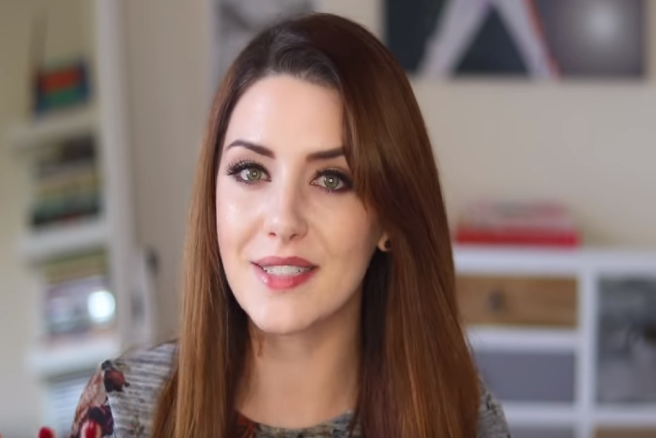
Irish blogger responds to ‘Detestable Freeloaders’ claim
On November 29th, Deborah Ross of The Times wrote what can only be described as a SCATHING article about influencers which began like this;
"I have a dream. It is not a big dream. I am not Martin Luther King. I only do dreams on a small scale, so it is a small-scale dream and my small-scale dream is this: might there be any way we could do a find and replace on the word “influencer” so it is replaced by “detestable freeloader” wherever it appears? So we all know what, in fact, we are dealing with."
Yikes. To add to the drama-fest, YouTuber and Blogosphere's Influencer of the Year 2018 Melanie Murphy has responded.
We have to say, Murphy makes some noteworthy points;
Starting off her 13-minute YouTube video with a cool "Okay Deborah, calm down", she proceeds to explain the hypocrisy behind Ross' points with a level of clarity which is hard to deny.
Ross essentially slated influencers in her article, describing them as 'detestable freeloaders', essentially people who deserve to be hated because they receive complimentary items and give nothing in return.
Murphy responds by issuing the point that the media in general is funded by advertising and marketing, for example, on the bottom of Ross' article had a sponsored post, without which the article possibly would never have been read.
Promotion and marketing absolutely surrounds us, from celebrities such as David Beckham for Adidas, Beyoncé for Pepsi, Justin Timberlake for McDonalds, Jessica Simpson for WeightWatchers, Brad Pitt for whatever cologne he's feeling that day, Julia Roberts for Lancôme, Hannah Witton for PlayStation, Holly Willoughby for Marks & Spencer etc etc.
It's inescapable. However, just because they receive free objects doesn't mean that they give nothing in return.
The issue which Murphy takes with Ross' article is the sheer hypocrisy as well as the generalisations which she makes. She places every influencer in the same category, when many of them promote noble causes such as LGBT+ charities and organisations, cruelty-free and paraben-free beauty products, health foods, nutrition, sexual health organisations, disability and accessibility rights, chronic pain activists, and more.
Jameela Jamil's i_Weigh movement has become hugely successful, and empowers people to weigh themselves on their overall worth as a person rather than their body mass index. Jamil suffered from an eating disorder for years, and now uses promotion and Instagram to create a unified group of people who value and respect themselves. She also is a major campaigner for banning airbrushing.
Melanie Murphy claims that every successful creative has the support of brands behind them, and receive freebies. Many of them self-fund their projects, and use the money for other causes, others simply give away any freebies which they receive.
Murphy also points out that just because they gain complimentary products does not mean that those people aren't extremely hardworking. Many influencers balance their life online with their family and a side-job.
"95% of what I show, what I wear, I pay for myself," she claims. Through advertising and word of mouth, companies can use influencers for their branding, but this doesn't undermine the level of thought which goes into choosing which brands to work with.
Murphy works with Always pads to talk openly about periods, Barclays, who sponsor Pride, a show which explores bisexuality, PicMonkey, Wella for hair dyes which work against allergies, Holland and Barrett for cruelty-free health and nutrition products.
Numerous influencers and their agents are hugely picky about who they work with, the brands must make sense for the influencers for them to collaborate with them.
"I'm always so bloody proud of my paid-for content, always. The money these brands pay me enables me to write a novel and work on more artsy things like short films which I invest in myself but don't get money back."
According to the Youtuber, the media wouldn't survive without branding and advertisements. From YouTube ads to websites, podcasts, radio, television, newspapers and magazines, advertising is saturated in our industry.
For Deborah Ross to call followers of influencers 'morons' is entirely unfair, from Melanie's point of view;
"Under-researched drivel such as this which contributes to the negative rhetoric that surrounds bloggers and influencers, thousands of hard-working people. Some of which juggle a family or another job."
Many believe for Ross to declare that influencers have done nothing to merit this lifestyle is flawed and reductive, Murphy herself demonstrates a great engagement because of how she chooses brands to work with;
"I never try sneak anything in, I'm never shady. I am lucky and I'm very grateful, I don't swan around."
Lastly, Murphy places emphasis on the fact that YouTube is a community which supports one another, they collaborate and shout each other out and lift each other up. In the journalism industry, there is minimal collaboration and no support between competing publications;
"You sit and write and you get aid to do that, there was a time where people would scoff at your job and say that that's not a real job. We actually support each other. You're not going to see The Times supporting an article from another publication."
She describes the loneliness which perpetuates society, and how YouTube can be used as escapism, or for self-help, for comedy, entertainment, advice or even just to connect;
"A lot of people are lonely and it's a beautiful thing to be able to connect with people through words through a lens. Families are smaller, the Church has collapsed, community has gone to shit. I feel like through my monthly blogs I encourage people to connect with their real-life friends and family"
As Murphy points out, building a following of thousands or millions doesn't just happen for no reason.
'Detestable freeloaders' aren't just empty vessels of advertisers; they're entertainers, they're singers, actors, writers, comedians, models, creatives, editors, lighting experts, agents and so much more.
Do you agree?
Feature image: teneightymagazine.com
Article by Kate Brayden









